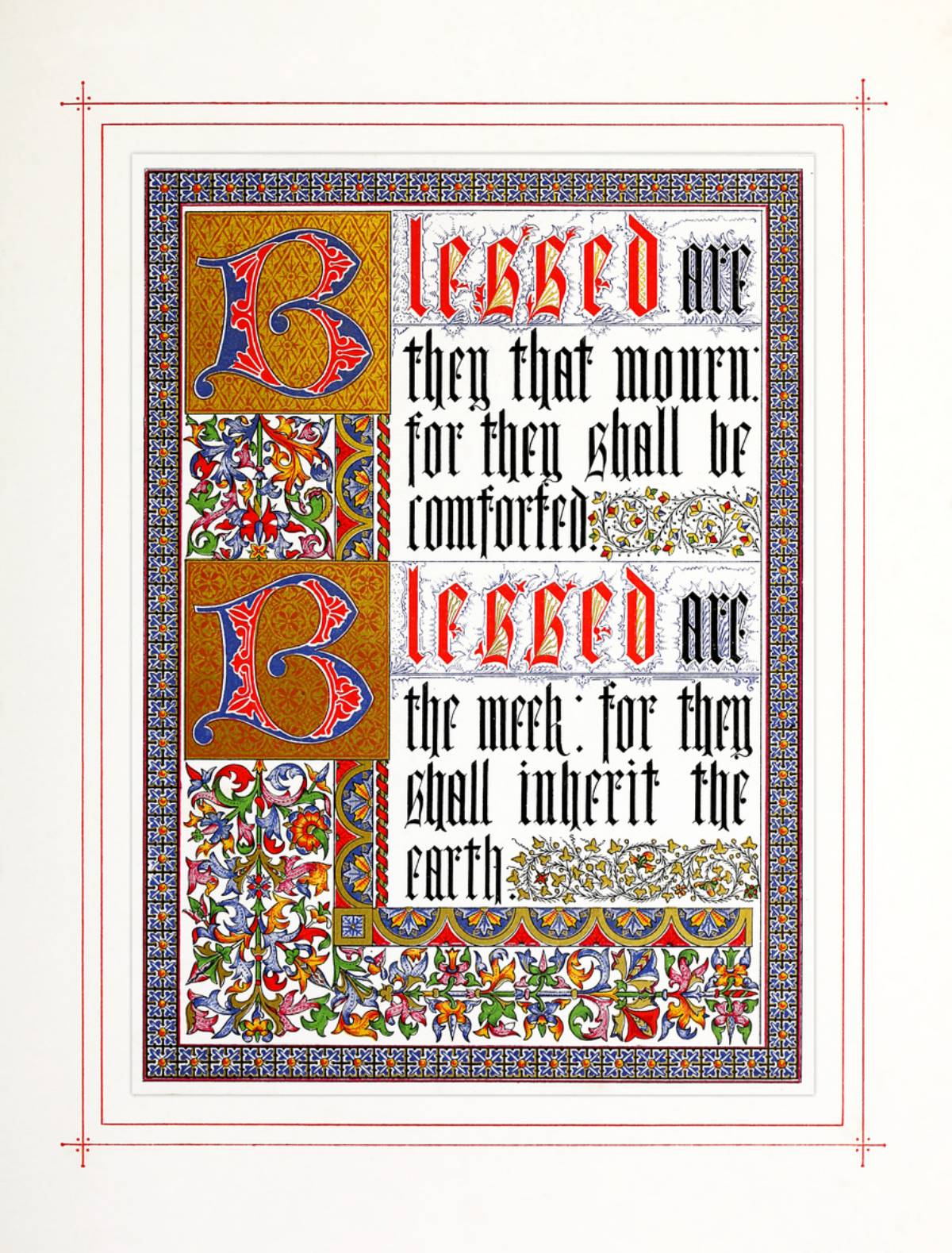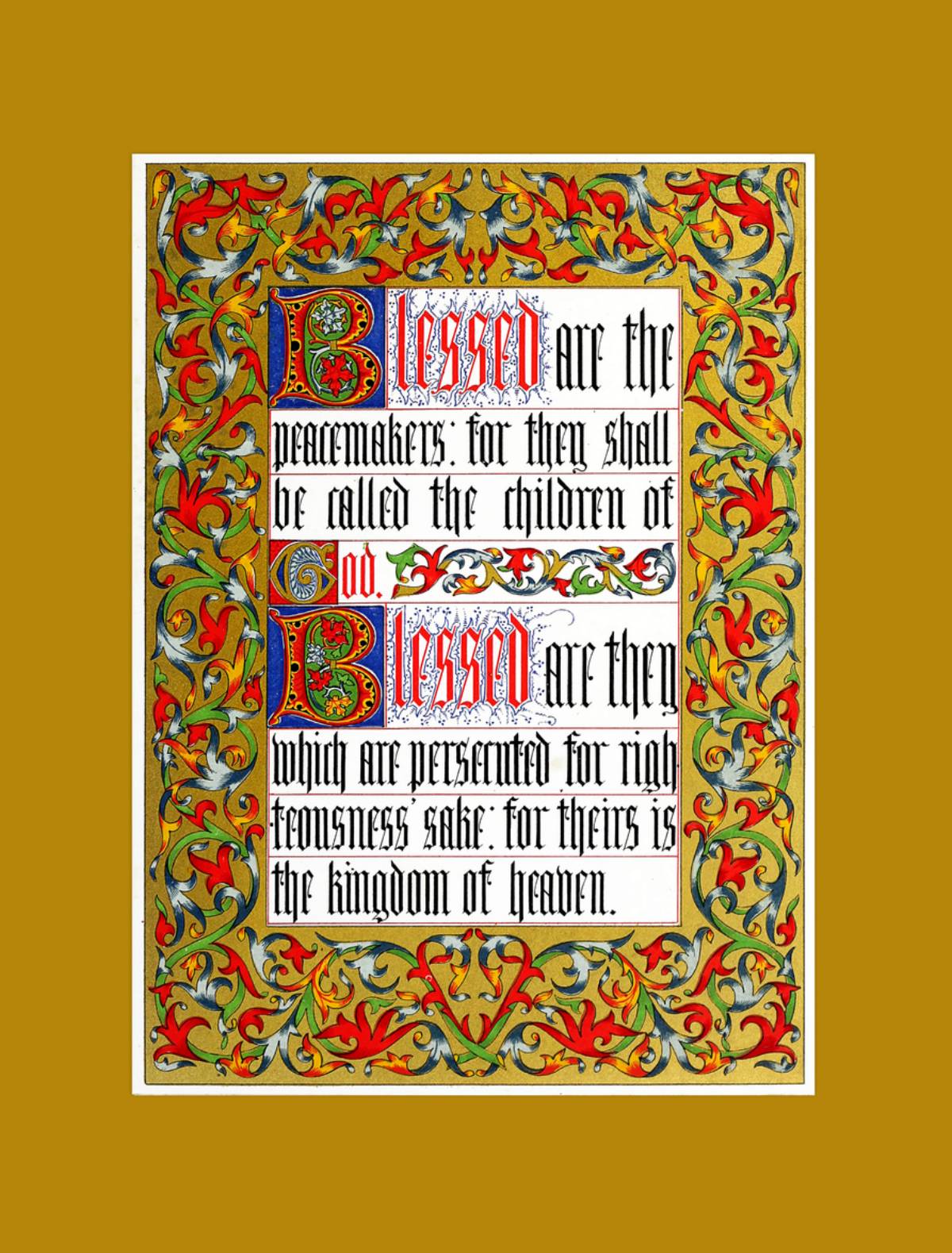Philosophers from the time of Socrates, Plato, and Aristotle, up to the present, have identified the ultimate end of our natural human desires as happiness. Christians understand this desire to be of divine origin, meaning that God has placed this desire in the human heart to draw us to the only One who can fulfill it. St. Augustine put it very succinctly when he wrote: “You made us for yourself, O Lord, and our hearts are restless until they rest in you.” This insight reveals that we are made for a divine purpose in this world, and it is only when we discern that purpose and begin to live it in our lives that we start to find the real happiness that we desire.

Our purpose as Christians, as disciples of Jesus Christ, is to come to know, to love, and to serve the Lord in our lives. We find the path to this happiness in the scriptures. In the 5th chapter of Matthew’s Gospel, at the beginning of Jesus’ Sermon on the Mount, we find the passage known as the Beatitudes, Matthew 5: 3-12. Jesus reveals the path to the happiness we seek in these simple, brief, but very challenging phrases. In them, we are challenged with the way, the truth, and the life that leads us to the true happiness that we desire, and Jesus is the very model, the embodiment of each one of the Beatitudes he offers us here.
The word for happiness in Latin is beatitudo. Each of the Beatitudes begins in the English translations with the word “Blessed” for those who follow these ways in their daily lives, will find the fulfillment of the ultimate beatitudo, or happiness, that they naturally desire. Beginning with verse 3 we see, “Blessed are the poor in spirit, for theirs is the kingdom of God.” The poor in spirit are both those who may have little in the way of material possession but whose confidence remains in God, and those who, from whatever rank or privilege in life, have become humble enough to recognize their complete and total dependence on God. Jesus tells us that, “theirs is the kingdom of God.” Beatitudo!

Jesus tells us that “Blessed are those who mourn, for they will be comforted” (v. 4). Those who mourn are those who see both their sins and the suffering they have caused. Because of this awareness, they are more able to see and to understand the suffering of others and to respond with knowing compassion and empathy. They are those who choose to walk with, to accompany those who are suffering, because they know what suffering is. In doing so, they are imitating Christ, they are living his way and doing his will. Beatitudo!
“Blessed are the meek, for they will inherit the land” (v. 5). The ‘meek’ are those who have developed the virtues of patient endurance and long-suffering, who are gentle, reverent, and peaceful. The word ‘land,’ here, does not just mean a piece of physical land, or a country; rather, it implies that they will come into that ‘land’ that is called the kingdom of God. Beatitudo!

Jesus says that those who “hunger and thirst for righteousness will be satisfied” (v. 6). These are those who have come to see and to willingly submit to the revealed wisdom of God and conduct themselves in moral conformity with God’s will. “Blessed are the merciful, for they will be shown mercy” (v. 7). In this beatitude, we hear an echo with another familiar phrase in Matthew’s Gospel on the Lord’s Prayer: “Forgive us our sins as we forgive those who sin against us” (Mt. 6: 12). It is those who have experienced the liberation and empowerment that comes from the mercy and the forgiveness of God who can have the compassion and empathy to forgive, to show that same mercy to others. They will ultimately be “satisfied” with the peace that can come from God alone. Beatitudo!
“Blessed are the clean of heart, for they will see God” (v. 8). If you want to see what being ‘clean of heart’ means, see Psalm 1: 1-3, or Psalm 15. It is those who are without blame, who speak the truth and do not slander or do harm to others with their words; those who honor the Lord in all things, who keep an oath despite the cost, and who lend no money at interest; and those who accept no bribes. Those who knowingly and willingly live in this way are promised that they will come to “see God” in the face. Beatitudo!

“Blessed are peacemakers, for they will be called children of God” (v.9). Those who struggle and sacrifice for peace in the name of Jesus in this world where the common reality of discord and conflict, violence and war, bring so much suffering, darkness, and fear, are truly different than the rest. They are so different that they bring rays of light and hope into the darkness, challenging those who are driven by anger, fear, hatred, and revenge with the light of Christ, the Prince of Peace. As peacemakers, they are the example of what being a child of God looks like in the world. And because they are so different, they are often persecuted. But Jesus tells us that those who are “persecuted for the sake of righteousness will enter the kingdom of God” (v. 10). Their suffering, persecution, and every kind of evil falsely done to them because of their love of Jesus, will be rewarded, “for their reward will be great in heaven” (vs. 11-12). Beatitudo!
The path to happiness, then, is to come to know God, to love him, and to serve him with our whole minds, hearts, souls, and strength; and our neighbor as ourselves. This is the goal of the Christian life in this world. It is in walking this narrow path that we will be able to finally come to the happiness that God has made us for, that is, the happiness we will experience when, by the grace and love of God, we come to dwell in God’s presence forever in heaven.

Lord, we pray that you give us the graces that we need to know you more deeply, to love you more dearly, and to serve you more sincerely in all that we do in our families, in our neighborhoods, and our workplaces. Help our hearts to finally come to rest in you, for you alone are the true source of the happiness our hearts desire. In Jesus’ name, we pray. Amen.
SKM: below-content placeholderWhizzco for FHB

